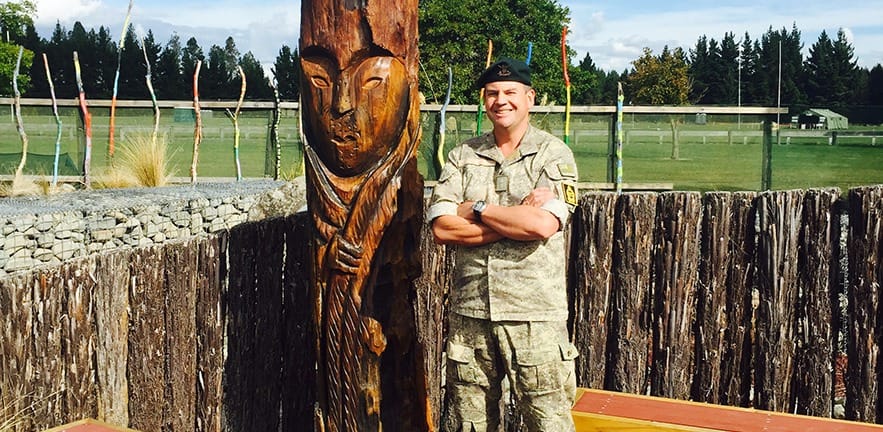Lieutenant Colonel Andrew Fox went to business school and came away with a new frame of reference.

Lieutenant Colonel Andrew Fox is no stranger to making tough decisions in tough circumstances: with 25 years as a serving officer in the New Zealand Army under his belt, he has faced the reality of leading a team in circumstances that few office-based business people will encounter.
But when it comes to leadership, Lt Col Fox firmly believes that the military and business have far more in common than most people think – not least because effective leaders in both worlds must excel at thinking on their feet, managing teams and exploring new ways of thinking.
“I’ve been fortunate to be able to both study and practice leadership in a variety of environments, but a new frame of reference is always valuable,” he says. “It’s a strengthening of the ability to approach a problem from not just one but a range of different perspectives.”
Lt Col Fox joined the Army straight from school in 1989 and holds a BA in Economics and Management from the Australian Defence Force Academy, as well as an MBA and a Master’s of Strategic Studies. His career has taken him all over the world. “Not always in the nicest places,” he says. “But it’s always been interesting.”
As a young officer in 1994, he commanded a platoon in Bosnia and he has completed two operational tours of East Timor: the second, in 2006, as Senior National Officer. More recently, he was Commanding Officer of the Army’s Provincial Reconstruction Team in Afghanistan from 2010 to 2011.
“It was fascinating and an amazing experience, and one of the highlights of my career so far,” he says. “The team was far more than purely a military solution. We had responsibility for assisting in economic development, education, medicine and local governance – everything you can think of that makes up the fabric of society. Although my team were primarily from a military background, the project involved dealing with a very broad range of people in a very multi-cultural environment within a complex situation.”
It was a similar diversity of participants that Lt Col Fox found so useful on the Advanced Leadership Programme (ALP) that he undertook in 2015. “The peer group was incredibly diverse,” he says. “I tend to do about 80 per cent of my learning from my peer group on a course and this was no exception. The people on the ALP were very different from those I’ve worked with before. Sectors ranged from law to finance to NGOs from all over the world, and from CEOs and founders of global businesses to SMEs. All of us are still in touch: we have a WhatsApp group and regularly share problems, experiences and thoughts.”
There were similarities, as well, enabling Lt Col Fox to share his experiences with other participants, and think about how Army leadership principles could be applied in business. One participant was dealing with a personnel issue that had impacted a major sale, and had to take time off from the course. “So we had a chat, and talked about the ability to train leaders within his organisation who could operate without him, and come to him with their own solutions.”
Lt Col Fox is now head of the Army Command School of leadership development – New Zealand’s equivalent of Sandhurst – a post he took up in December 2015. He’s looking forward to applying his new learnings. “The ALP has been a great opportunity for me to take a breath outside the day-to-day business, reconsider some of my priorities, continue my learning journey,” he says. “And it’s also a chance to think about what the future may bring, or more importantly, what I may bring to the future.”
Andrew is interested in hearing from…
…people or organisations that are developing their senior executive leadership, especially in cross cultural and/or complex environments..

